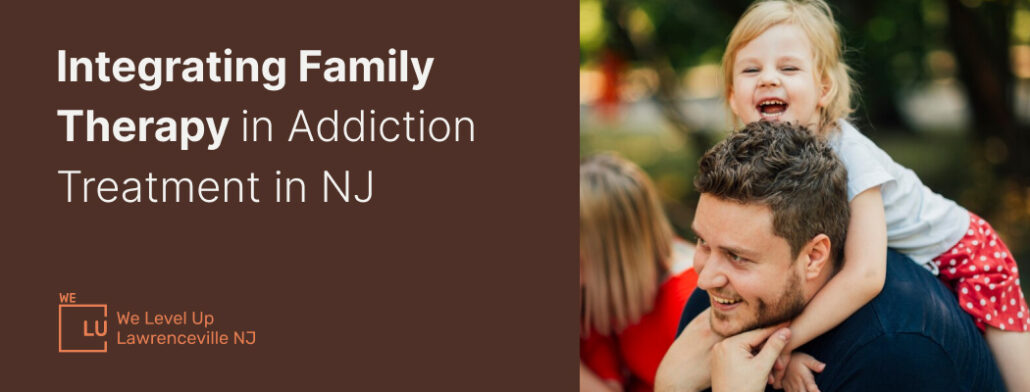As you start your recovery journey, you will have to focus on various aspects of your life. One of these is the effect your addiction has on other family members. Through therapy for addict’s family and by integrating family therapy in addiction treatment,, any problems you may face can be resolved in a safe and healthy environment.
Skip To:
Family therapy models available in NJ
The We Level Up Lawrenceville NJ family program is the most efficient way to help you and your family. These therapy models are designed to address the specific needs and patterns that emerge in families dealing with addiction.

Family behavior therapy combines behavioral contracting with contingency management to address behavioral problems as well as substance abuse. Here, the person in recovery and at least one parent participate and carefully choose specific interventions from a menu of evidence-based treatment options. Therapists are here to encourage family members to use behavioral strategies taught in sessions and apply their new skills to improve their home environment.
On the other hand, functional family therapy integrates a systemic perspective on family dynamics, positing that dysfunctional interactions contribute to problematic behaviors. This model incorporates behavioral techniques to enhance communication, problem-solving abilities, conflict resolution, and parenting skills within the family unit. Central to FFT are several key treatment strategies:
- Engagement: Actively involving families in the therapeutic process and fostering their motivation for change.
- Behavior Modification: Utilizing various techniques such as contingency management (CM), communication and problem-solving exercises, behavioral contracts, and other evidence-based methods to alter maladaptive behaviors among family members.
By employing these strategies, FFT seeks to promote positive familial interactions, strengthen bonds, and equip families with the skills necessary to navigate challenges effectively. This comprehensive approach acknowledges the interconnectedness of family dynamics and empowers families to cultivate healthier relationships and supportive environments conducive to long-term well-being and recovery.
For families in New Jersey, these models provide a framework for understanding and addressing the challenges of addiction. Each model offers unique strategies and focuses, catering to different family dynamics and needs. Families can explore these options through local addiction treatment centers or family counseling in addiction teratment specialists. Many of these services are accessible and can be tailored to fit the specific circumstances of each family.

Family support in addiction treatment is key to recovery
In order for family support to be effective, every family member needs to participate actively. Each family member, whether a parent, child, or spouse, has a unique and vital role in supporting their loved one’s journey towards sobriety. Understanding these roles not only enhances the treatment process but also fosters a healthier family dynamic.
Through therapy, your parents can get a better understanding of what you’ve been going through and how they can help you. It’s a safe and comfortable place where you can apologize and forgive for past mistakes that may still be on your mind years after they’ve happened. This is a big step in healing your childhood trauma and overcoming psychological obstacles that may keep you further from sobriety. You may gain support from your parents like never before that can help you stay on the right path. Plus, it will be easier to set boundaries and achieve good communication.
Get Help. Get Better. Get Your Life Back.
Searching for Accredited Drug & Alcohol Rehab Centers Near You? Or Mental Health Support?
Even if you have failed previously, relapsed, or are in a difficult crisis, we stand ready to support you. Our trusted behavioral health specialists will not give up on you. Call us when you feel ready or want someone to speak to about therapy alternatives to change your life. Even if we cannot assist you, we will lead you wherever you can get support. There is no obligation. Call our hotline today.
FREE Addiction Hotline – Call 24/7If you have children, don’t keep your recovery from them. Keep them in the loop about what you’re going through and educate them about the dangers and consequences of substance abuse. Children, even though they might be young, are significantly impacted by a family member’s addiction. When they are involved in the recovery process, it can help them understand the situation better. This can reduce any confusion and fear they may experience. Involving children in family therapy helps them express their feelings in a safe environment and learn healthy coping mechanisms. This involvement is the key to preventing generational cycles of addiction.
Your spouse may be the closest witness to your addiction struggles. You may have noticed problems regarding your relationship as well. Through integratng family therapy in addiction treatment , you can address these issues and rebuild trust. Joint participation can improve communication, laying a foundation for a healthier relationship post-recovery. Each member contributes differently, but all are crucial in creating a supportive environment. Family involvement in addiction treatment and support groups can provide the necessary guidance and tools for each family member to effectively play their part in the recovery journey.

Tailoring therapy to family needs and successfully integrating family therapy in addiction treatment
Each family is unique, with its own dynamics, challenges, and strengths. Recognizing this, therapy sessions are customized to address the particular needs of each family. For example, at We Level Up NJ Family Program, therapists assess the family’s situation to determine the most effective approach. This is the best way to ensure that family therapy in addiction treatment is effective.
How does this work specifically? Firstly, we need to consider who is in recovery and what is their role in the family. Not only does every family have its unique dynamic, but between all members exist unique connections. In case a parent is the one battling addiction, therapy might focus on how their addiction has affected their children. Therapy is a safe place where everyone can express their feelings and work on rebuilding trust as well as improve communication. If the children are young, the therapist can help them express their feelings clearly.

Get Your Life Back
Find Hope & Recovery. Get Safe Comfortable Detox, Addiction Rehab & Mental Health Dual Diagnosis High-Quality Care at the We Level Up Treatment Centers Network.
Hotline (877) 378-4154In another situation, if a teenager is the one dealing with addiction, therapy might concentrate on understanding the family’s influence on the teen’s behavior and vice versa. If the addiction has caused marital strain, family therapy in addiction treatment can also focus on the problems spouses face. With the help of a therapist, couples can learn techniques such as conflict resolution. The key is that no two families are the same, and neither are their therapy needs. Local New Jersey facilities like We Level Up recognize this and strive to provide personalized therapy experiences.

Challenges and benefits of family therapy in addiction treatment
Navigating family therapy during addiction treatment such as opioid detox NJ isn’t without its challenges. It’s not uncommon for some family members to hesitate, feeling uneasy about delving into personal and familial matters in a group setting. Furthermore, peeling back layers to unearth deep-seated family issues can stir up raw emotions, potentially intensifying existing tensions within the family unit.
Yet, despite these initial challenges, the help for family members of addicts is profound. Through therapy sessions, family members embark on a journey of expression and active listening, fostering deeper connections and mutual understanding. This is instrumental in creating a nurturing atmosphere crucial for supporting the recovery of the person in need.
Comfortable Facilities & Amenities
High-Quality Addiction & Mental Health Rehabilitation Treatment
Rehab Centers TourRenowned Addiction Centers. Serene Private Facilities. Inpatient rehab programs vary.
Addiction Helpline (877) 378-4154Proven recovery success experience, backed by a Team w/ History of:
15+
Years of Unified Experience
100s
5-Star Reviews Across Our Centers
10K
Recovery Success Stories Across Our Network
- Low Patient to Therapist Ratio
- Onsite Medical Detox Center
- Comprehensive Dual-Diagnosis Treatment
- Complimentary Family & Alumni Programs
- Coaching, Recovery & Personal Development Events
One of the commonly overlooked benefits of family therapy in addiction treatment is that it helps educate people about addiction as a chronic illness rather than a moral failing. Now, family members won’t be as inclined to blame the person in recovery. Rather, it makes it easier for them to be empathetic and connect to them. In New Jersey facilities, educational sessions about addiction form the cornerstone of family therapy, paving the way for more effective and compassionate support from loved ones.
However, the benefits of family therapy in addiction treatment extend beyond the person in recovery. It’s also the chance for all family members to heal and grow. By addressing each member’s unique needs and issues inflicted by addiction, therapy facilitates a holistic journey towards healing. Enhanced communication, profound education about addiction, and collective healing stand as testaments to the invaluable role of integrating family therapy in addiction treatment and the recovery journey. For those navigating rehab facilities in New Jersey, embracing the transformative potential of family therapy marks a significant step towards lasting recovery and familial harmony.

Support services for families and how does family therapy help in addiction treatment
Family counseling in addiction treatment isn’t the final step. It’s actually the beginning of a lifelong process of building healthy relationships and staying sober. That’s why support services from rehabs in NJ are important – you can rest assured that you have the support you need after therapy and rehab. These services often encompass a variety of resources tailored to address the unique needs and dynamics of each family. One key component is ongoing counseling or therapy sessions, which provide a safe space for family members to continue processing their emotions, improving communication skills, and addressing any lingering challenges or conflicts. These sessions may be conducted individually or in a group format.
Additionally, psychoeducation workshops and support groups offer valuable information about addiction, entering detox in New Jersey, relapse prevention strategies, coping mechanisms, and healthy boundaries, empowering families with the knowledge and skills necessary to navigate the complexities of addiction recovery. Practical assistance such as financial counseling, housing support, childcare services, and access to community resources can also alleviate stressors that may contribute to relapse or familial discord. Moreover, peer support networks and online forums provide opportunities for families to connect with others who are facing similar challenges, fostering a sense of belonging and reducing feelings of isolation. Families can cultivate a supportive environment conducive to sustained recovery and holistic well-being by integrating these comprehensive support services into post-therapy care plans.

Intervention, ongoing support and family involvement in addiction treatment in New Jersey
Through an intervention, you may break through their denial and make them aware of the consequences of their addiction. An intervention can encourage them to accept help their substance abuse problem and start inpatient rehab NJ. The primary purpose of an intervention is to break through the person’s denial, make them aware of the consequences of their addiction, and encourage them to accept help for their substance abuse or behavioral issues.
Organizing an intervention involves several key steps:
- Gather a group of concerned individuals who have a close relationship with the person struggling with addiction.
- Consider involving a therapist experienced in addiction.
- Educate yourself and the intervention team about addiction, treatment options, and the specific issues your loved one faces.
- Select a neutral and comfortable location for the intervention, ensuring the addicted individual feels safe and supported.
- Plan what each participant will say during the intervention. Express concern, love, and a desire to see them seek help. Avoid blaming or confrontational language.
During the intervention, emphasize the following:
- Love and Support: Make it clear that your primary goal is to help, not to judge or criticize.
- Consequences: Discuss the negative consequences of their addiction on their life and the lives of those around them.
- Treatment Options: Present viable treatment options and resources, including a clear plan for immediate action.
- Boundaries: Set clear boundaries and consequences if the individual refuses help.
It’s essential to remember that interventions can be emotionally charged, and the addicted person may react with anger, denial, or defensiveness. Be prepared for resistance, and remain calm, compassionate, and persistent. Ultimately, an intervention is a powerful tool that can lead individuals struggling with addiction to acknowledge their problem and take the crucial step toward recovery.
World-class, Accredited, 5-Star Reviewed, Effective Addiction & Mental Health Programs. Complete Behavioral Health Inpatient Rehab, Detox plus Co-occuring Disorders Therapy.
CALL (877) 378-4154End the Addiction Pain. End the Emotional Rollercoaster. Get Your Life Back. Start Drug, Alcohol & Dual Diagnosis Mental Health Treatment Now. Get Free No-obligation Guidance by Substance Abuse Specialists Who Understand Addiction & Mental Health Recovery & Know How to Help.
When it comes to intervention and ongoing support in New Jersey, these are crucial elements in the fight against addiction. Interventions often serve as the first step in acknowledging and addressing the issue of substance abuse. They are carefully planned meetings involving family members, friends, and sometimes an intervention specialist aimed at encouraging the loved one to seek treatment. Following an intervention, ongoing support becomes key to sustainable recovery.
This includes continuous family involvement, support groups, and aftercare programs that provide the necessary resources and community for both the individual and their family. In New Jersey, various programs offer these services, focusing on compassionate and comprehensive care. These facilities and programs are designed to support individuals and their families at every step of the recovery process, from intervention to ongoing aftercare.
Family involvement in addiction treatment
Addiction is not a problem that affects only one person. It contributes to and creates various problems for other members of the family. When not dealt with, these problems can progress and be even more difficult to overcome. That’s where family therapy in addiction treatment comes in. You can have the support you need to solve family problems, overcome addiction, and heal long-term.
Experience Transformative Recovery at the We Level Up Treatment Center.
See our authentic success stories. Get inspired. Get the help you deserve.



Start a New Life
Begin with a free call to an addiction & behavioral health treatment advisor. Learn more about our dual-diagnosis programs. The We Level Up treatment center network delivers various recovery programs at each treatment facility. Call to learn more.
- Personalized Care
- Caring Accountable Staff
- Comfortable Amenities
- Licensed & Accredited
- Renowned w/ 5-Star Reviews





